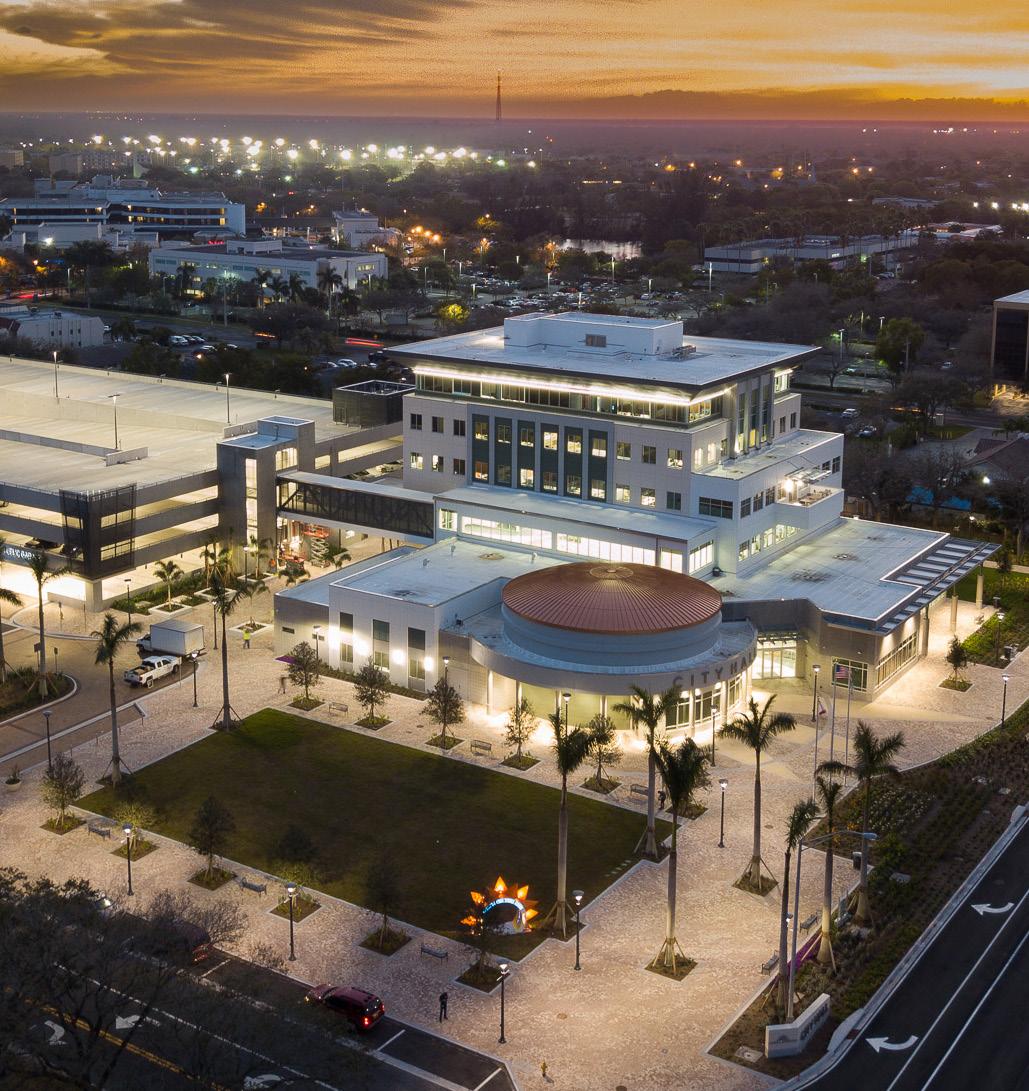






















The City of Coral Springs is proud to achieve LEED Gold Certification under the LEED for city and Communities Rating System. The certification celebrates community-wide accomplishments and reinforces the city’s commitment to enhanced quality of life, innovation and leadership.
LEED (Leadership in Energy and Environmental Design) for Cities and Communities is the leading global rating system and certification program for evaluating the sustainability and quality of life in a city or community. The rating system encompasses economic, environmental and social performance measures and provides a clear data-driven approach to benchmark and communicate progress. It is intended to help cities and communities manage resources sustainably and foster the health and vitality of all life.
This program aligns with Coral Springs’ Sustainability Action Plan, Strategic Goals and Vision to be the premier community in which to live, work and raise a family. Coral Springs is the second city in Broward County to achieve this award.
• It verifies Coral Springs’ commitment to sustainability and resilience.
• It enhances the city’s culture of data-driven
The certification was identified as a priority by the city Commission during strategic planning in 2023. In 2024, Coral Springs was selected to participate in the LEED for Cities Local Government Leadership Program. After extensive cross-departmental collaboration and data collection, Coral Springs was awarded Gold Certification in June 2025. The achievement was commended by a Commission Proclamation in October 2025. The results will be used to advance sustainability goals and objectives.
Note: The LEED for Cities Certification is meant to be applied across diverse communities and cities throughout the world. Some certification criteria may not apply or may differ from local practices and standards.

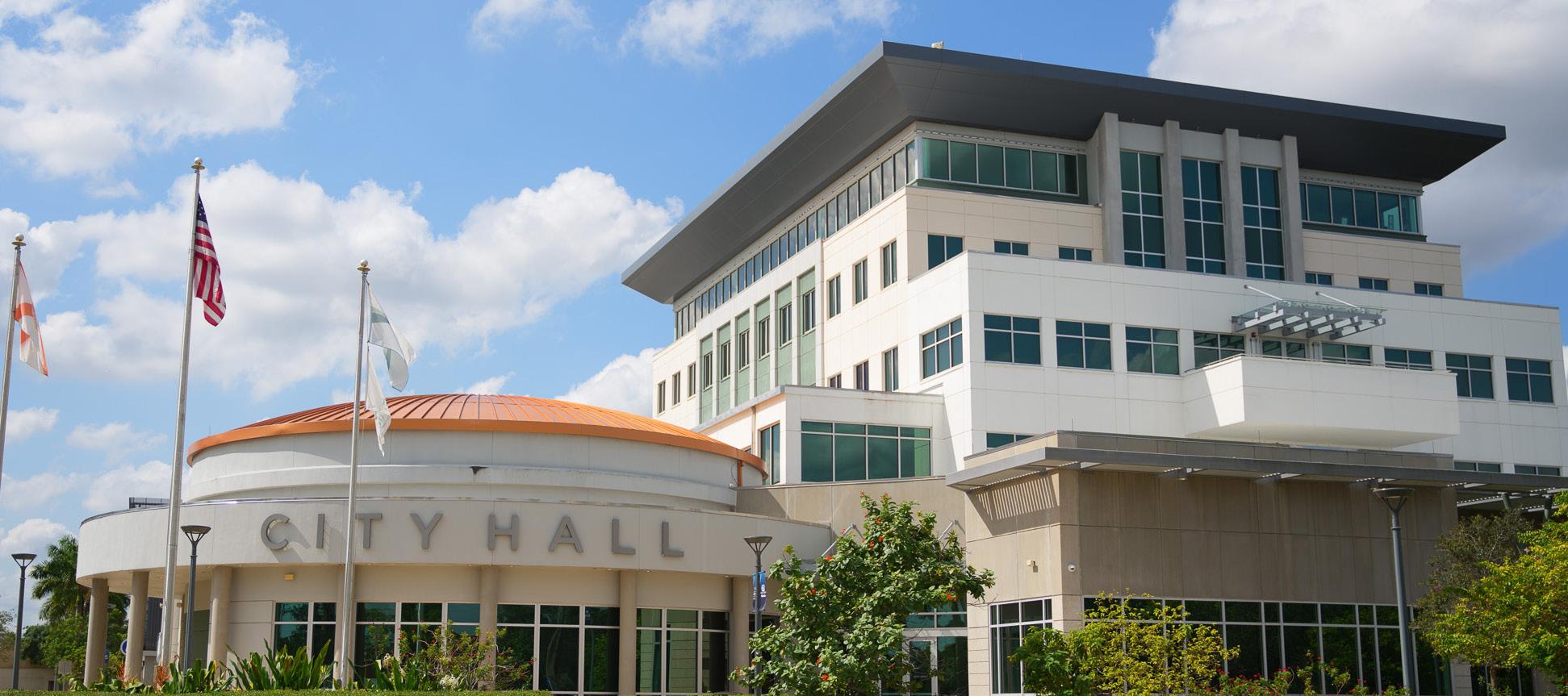
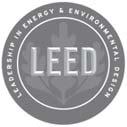
This report contains the results of the technical review of an application for LEED® certification submitted for the specified project. LEED certification is an official recognition that a project complies with the requirements prescribed within the LEED rating systems as created and maintained by the U.S. Green Building Council® (USGBC®). The LEED certification program is administered by Green Business Certification Inc. (GBCI®).
City of Coral Springs
Project ID 1000127470
Rating System & version: LEED v4.1 Cities and Communities: Existing Cities
Project Registration Date: January 9, 2025


ATTEMPTED: 69, NOT AWARDED: 08, PENDING: 00,









61 OF 110 POINTS

The Integrative Process category gauged level of preparation and interdisciplinary relationships needed to deliver highperformance, cost-effective and positive programs and services related to green buildings and sustainable development.
• Integrative Planning and Leadership: 1/1
To begin the LEED for Cities Certification process, an interdisciplinary and crossdepartmental team was assembled. The team analyzed eligibility for the LEED certification process, created a LEED action plan and demonstrated how sustainability principles and performance measures were currently integrated in Coral Springs’ comprehensive plans. This team reflects the existing Sustainability Liaison staff group that is responsible for implementing the city’s Sustainability Action Plan.
Coral Springs encourages green building principles during the site plan review for new development and redevelopment projects. The Development Review Committee (DRC) requests the applicant submit information for each project reviewed. This information may be used at a later date to one day implement additional policies and/or incentives for new construction or redevelopment. Additionally, there are existing development incentives for projects seeking LEED Silver certification within the Industrial, Research and Development (IRD) Zoning District. These incentives include reduced setbacks and no minimum required percentage for overall landscaped open space. As redevelopment occurs, Coral Springs will continue to review and consider options to implement various forms of sustainable practices.


Ecology is the study of living organisms and the interaction with their environment. Natural systems refer to the interconnectivity within ecosystems that include landforms, water bodies, flora and fauna which is influenced by interactions between climate, soil conditions and the organisms that inhabit these environments. Ecosystems protect and even regenerate natural systems, thereby increasing the ecosystem services they provide and creating ecologically resilient communities. This interconnectivity helps to not only sustain life but also enhances the quality of life.
• Ecosystem Assessment: Required
° A comprehensive narrative was submitted which provides information on topography, soils, terrestrial vegetation and habitat, hydrology and aquatic ecosystems, as well as pollution sources and threats. The Ecosystem Assessment report provided a summary of all the data collected for the city in order to establish a baseline for existing conditions and future trends. Most of the data was obtained from the city’s Stormwater Master Plan with additional data gathered from Broward County and the U.S. Fish & Wildlife Service.
• Light Pollution Reduction: 1/1
° Lighting Ordinance. Light pollution can affect the quality of life of humans, wildlife and environment. Excessive lighting can disrupt the natural light patterns and the delicate balance of our environment. A lighting ordinance
can help to minimize and manage ambient light levels to protect public health and the integrity of ecological systems. The city regulates exterior lighting based on the zoning district in which a property is located. Lighting is measured by footcandles where one footcandle is defined as the amount of illumination provided by one lumen uniformly distributed on one square foot of surface. Minimum requirements ensure parking lots are properly illuminated while maximums reduce the possibility of light pollution. In addition to illumination requirements, height limitations of light fixtures ensure the poles are appropriate for the zoning district in which they are located.
• Resilience Planning: 2/4
° Vulnerability and Capacity Assessment. Climate change can lead to serious impacts through increased floods, droughts and wildfires. These impacts can shift ecosystems and disrupt quality of life. Through a vulnerability and capacity assessment, the city is able to identify climate change risks, natural and manmade hazards and extreme events. These threats were obtained from the city’s Comprehensive Emergency Management Plan (CEMP), Emergency Operations Plan (EOP) and the Stormwater Master Plan and Vulnerability Assessment. Additional information was utilized from regional data gathered by the Southeast Florida Regional Climate Change Compact Steering Committee (SFRCCC).
° Resilience Plan. Broward County is currently developing a resilience plan which the city will adopt. This two-year county-wide effort focuses on building community resilience to the impacts of climate change predicted over the next half-century, with a primary focus on flood and heat mitigation. The Resilience Plan includes economic analyses of flood risk and adaptation investments such as hazard exposure, first party loss, indirect impacts and key impact metrics. Additionally, the Stormwater Master Plan and Vulnerability Assessment, as well as the CEMP and EOP, include extensive descriptions of adaptation and mitigation strategies to flood vulnerabilities, natural and human-induced threats and hazards, stakeholder engagement and monitoring and evaluation.
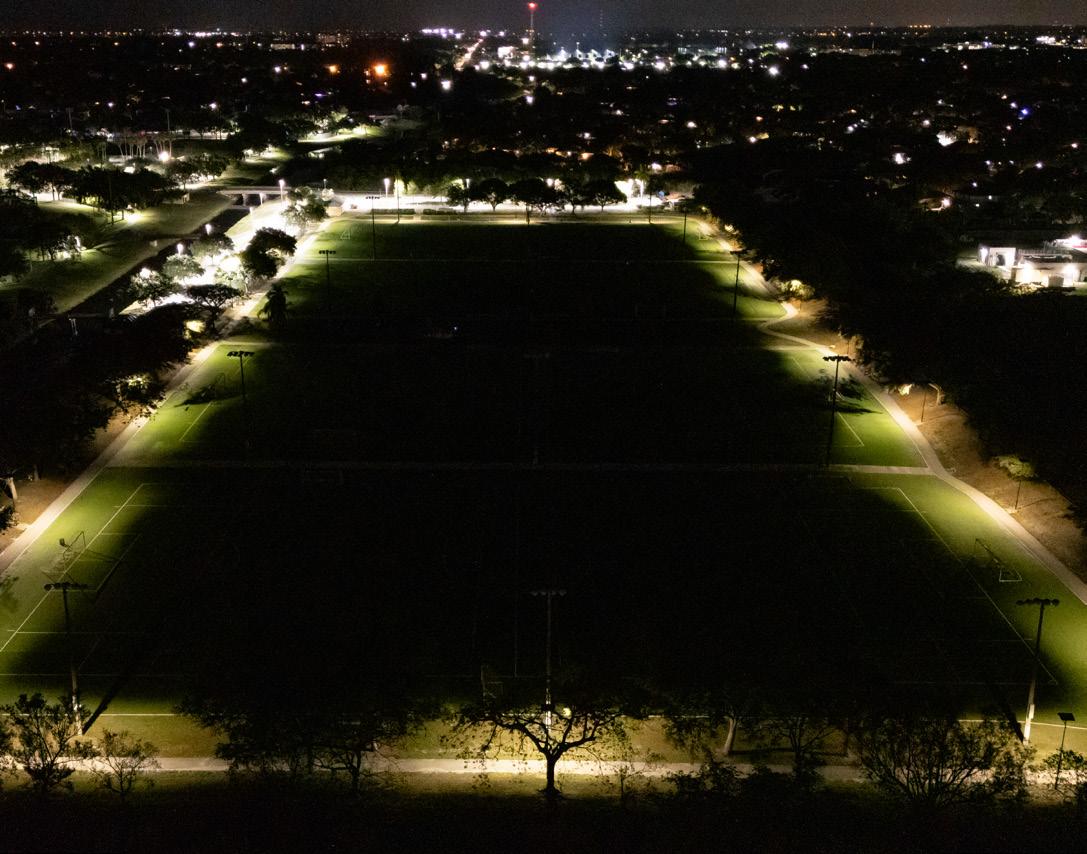
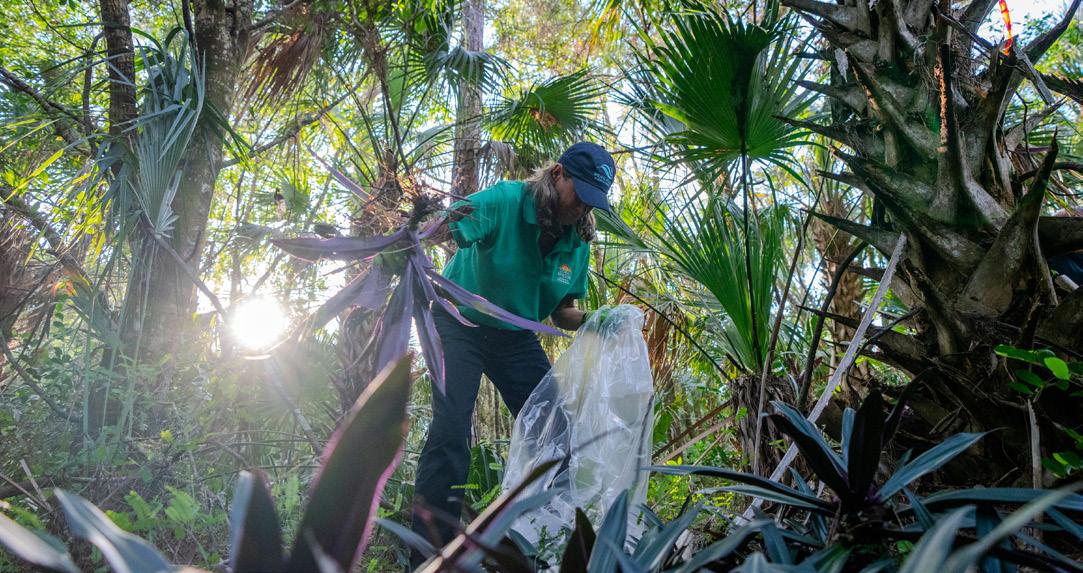
While Coral Springs did not obtain credits for Green Spaces and Natural Resources Conservation and Restoration, it is important to note that the city maintains 49 parks which include community parks, neighborhood parks, trails, preserve areas, sports grounds, a dog park and community garden. This equates to approximately 1,181 acres (7%) of the total city area. However, LEED for Cities requires a minimum 15% of publicly accessible green spaces for the total city area.
Coral Springs remains as one of the highperforming cities in Broward County with regard to our parks and recreational amenities. The city continues to maintain a level of service for public parks of at least 4 acres of developed park land per 1,000 residents within the city, a goal that is emphasized in the city’s Comprehensive Plan.


The relationship between transportation and land use has been examined over time to help create policies. Land use policies act as a foundation to transportation policies, allowing for different types of development and the subsequent need for motorized vehicles and mass transit. This category encourages cities to adopt an integrated approach toward urban planning. This includes mixed-use development; efficient transportation infrastructure to reduce reliance on single occupancy vehicle trips; provision of cleaner, healthier, safer and more equitable connectivity options; and engagement with stakeholders.
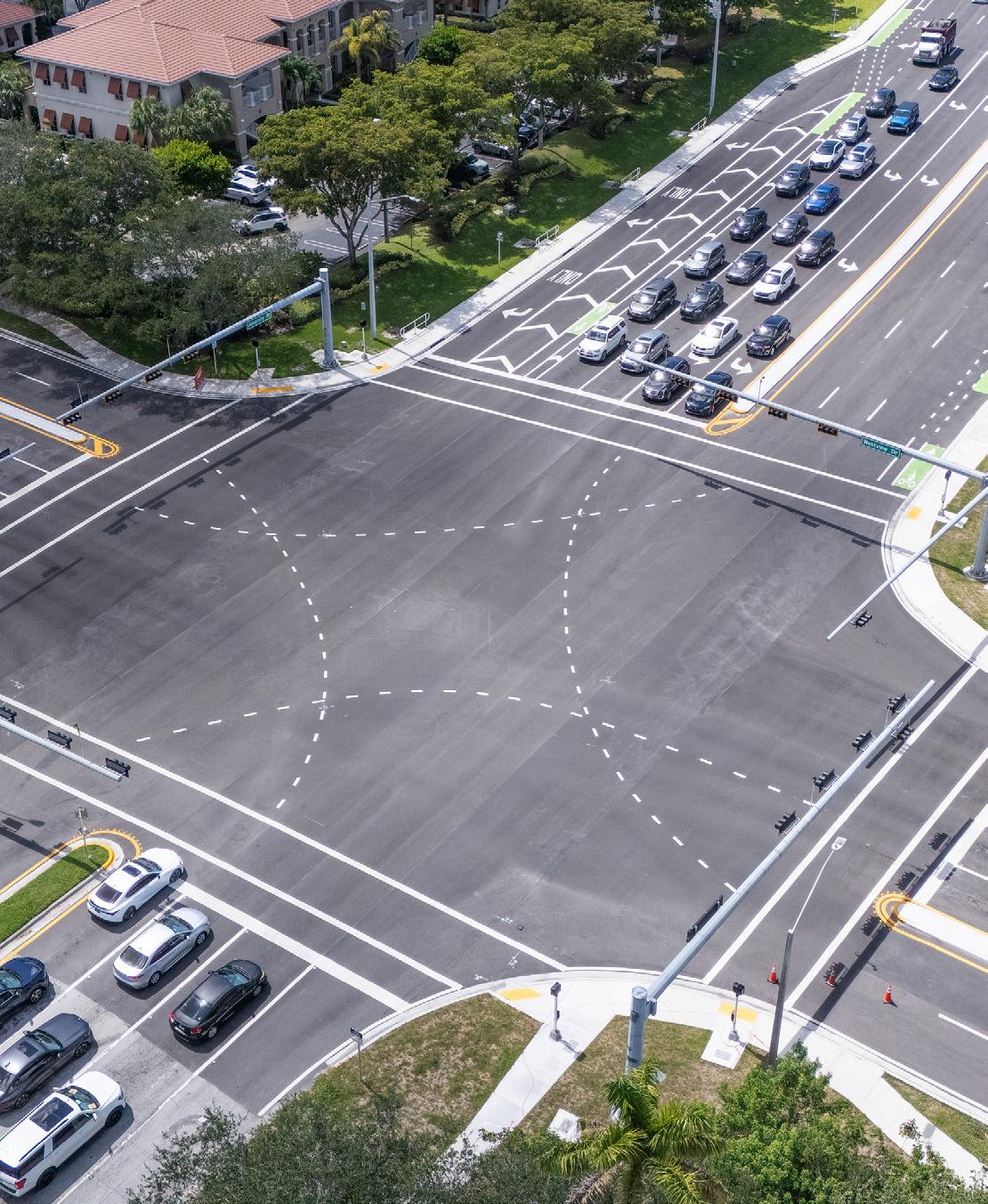
• Transportation Performance: 6/6
The focus of this prerequisite is to quantify and improve transportation options that lead to increased walking, biking and public transit use which have positive environmental and health benefits.
° Modal Split. Data was collected over a one-year period (2022) to show the percentage of population that commutes to work by the below transportation modes.
° Transportation Performance. Vehicle Miles Traveled (VMT) is an indicator of the commute pattern of a region that typically depends on compactness, access to public transit facilities and diverse uses and infrastructure for walking and bicycling. The daily VMT calculated for 2022 was 14.76.
• Clean Transportation: 1/1
° Electric Vehicle Charging Facilities. This credit encourages cities to promote alternative fuels for vehicles that are lower-emitting and non-gasoline-based. To achieve this credit, the total number
of electric vehicle supply equipment (EVSE) for plug-in electric vehicles was identified throughout the city. In 2024, there were 14 public, level 2 or higher EV charging stations in the city, with two additional locations proposed in new development projects.
• Priority Sites: 1/1
° Historic Preservation. The city recently adopted a Historic Preservation Ordinance (Ordinance 2024-111) to preserve historic buildings and districts. With the city celebrating its 60th anniversary in 2023, certain sites have become eligible for historic designation, such as the covered bridge and history museum. The Historic Preservation Board (HPB) will help aid property owners through the process and procedures when altering contributing and non-contributing structures located throughout the city.

As Coral Springs continues to grow, additional policies will be examined and created. One such example is the creation of the Downtown Mixed-Use (DT-MU) Zoning District which allows for commercial and residential uses to coexist. As development occurs within this zoning district, the opportunity exists to create mixed-use developments with improved access to public transit. Coral Springs has made and continues to make improvements to streets to include bicycle lanes, sidewalks and crosswalks to comply with the Americans with Disabilities Act (ADA). Further, Coral Springs has obtained $20 million in grant funding to ensure accessibility improvements are made throughout the city. The city also continues to work with entities such as the Broward Metropolitan Planning Organization (MPO) and Broward County Transit to enhance the city-wide transportation system.
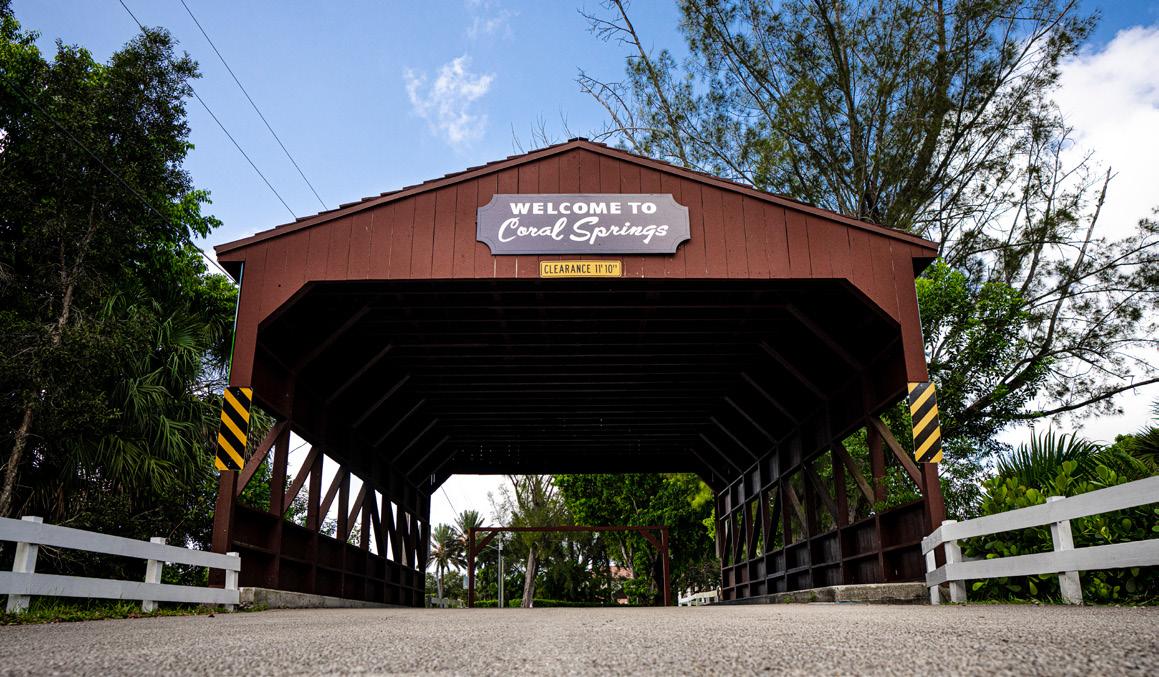


Category Summary
Water is the lifeline of any city. This credit category addresses water at multiple levels –meeting demand, maintaining water quality, reducing water losses, capturing stormwater and managing urban floods.
Credit Summary
• Water Access and Quality: Required
° Water and Sanitation Access. All habitable structures within the city of Coral Springs have access to public water supply and most have access to public sewer. The two areas within the city that do not have access to public sewer utilize septic tanks. Per the Coral Springs Code of Ordinances, property owners are required to connect to the city’s water and sewer systems within 30 days from the time the system is available.
° Drinking Water Quality. There are four drinking water districts in Coral Springs. All four districts comply with state regulations for chemical and microbial contaminants, conduct sanitary survey inspections and publish annual Consumer Confidence Reports. Additional information about the City of Coral Springs Water District and water quality can be found on the city’s website.
° Treated Wastewater Quality. All wastewater in Coral Springs is sent to and treated by Broward County. Broward County Water and Wastewater Services complies with state regulations and with U.S. EPA’s National Pollutant Discharge Elimination System permit program
for 100% of wastewater generated and treated.
° Stormwater Quality. Rainwater in cities picks up oil and other pollutants while flowing over impervious areas such as roof tops, paved surfaces and parking lots before entering water bodies. Proper stormwater management by harvesting and treating runoff can help reduce flooding and pollution. Coral Springs submits annual documentation to confirm that stormwater quality complies with the U.S. EPA’s National Pollutant Discharge Elimination System (NPDES) permit program.
• Water Performance: 5/6
° The Water Performance prerequisite encourages cities to track and monitor per capita water consumption in the domestic sector. Residential and multifamily water consumption and population count were collected from all four water districts in the city for the calendar year 2023. Total residential water consumption per person per year = 22,918.19 gallons. Total residential consumption per person per day = 62.79 gallons.
• Integrated Water Management: 1/1
° Coral Springs’ water utilities are within the jurisdiction of the South Florida Water Management District, which serves to manage and protect water resources, quality and supply. Almost all water is drawn from the Biscayne Aquifer. The North Springs Improvement District also sources water from the Floridan Aquifer.
• Stormwater Management: 1/2
° Stormwater Management Regulations. Coral Springs implements best stormwater management practices and complies with regulations in multiple ways. The city operates within the greater Broward County and South Florida Water Management jurisdictions and complies with regulations. The city’s Stormwater Master Plan evaluates existing stormwater infrastructure and aims to increase community resilience to current and future flooding by identifying infrastructure solutions, protecting property and improving city ratings that determine flood insurance costs. Specifically, the city’s efforts are reported to FEMA’s National Flood Insurance Program (NFIP) and Community Rating System (CRS), which leads to greater property insurance premium discounts city-wide. Coral Springs also conducts periodic National Pollutant Discharge Elimination System Stormwater Program audits. Audits include efforts to prevent
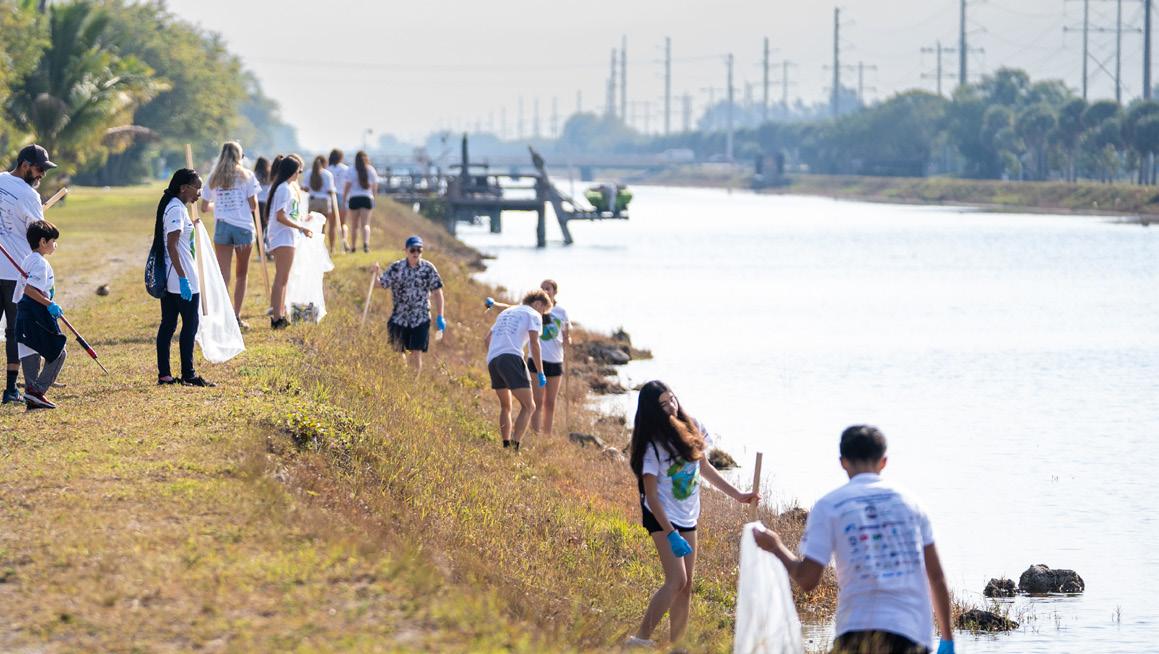
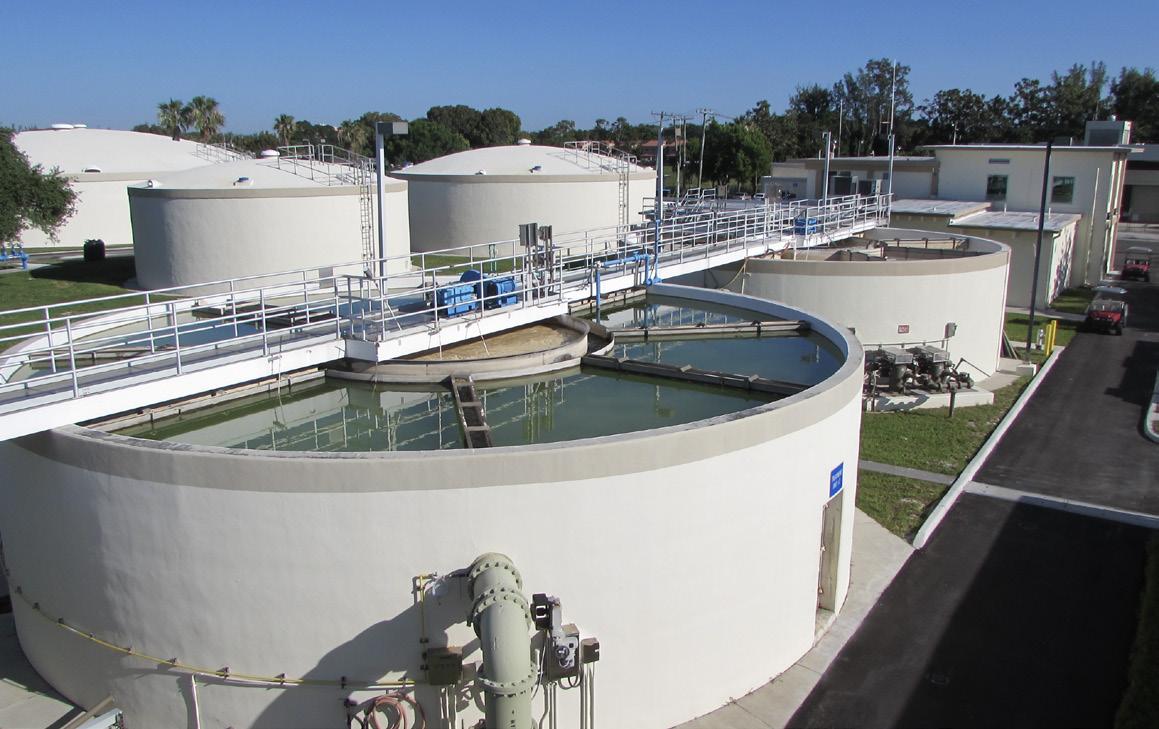
erosion and reduce runoff, pollution, siltation and sedimentation while recharging groundwater and provision of accessible green infrastructure.
• Smart Water Systems: 1/2
° Water Audit. Smart Water Systems encourage cities to improve operational efficiency, reduce water losses and monitor water flow. The State of Florida manages water resources by issuance of Water Use Permits to each water utility, including the four water utilities in the City of Coral Springs. The permits establish a water volume each utility may withdraw from the aquifer based on community needs, requires water systems to install and audit flow meters, track and mediate water loss and submit reports with daily to annual data.
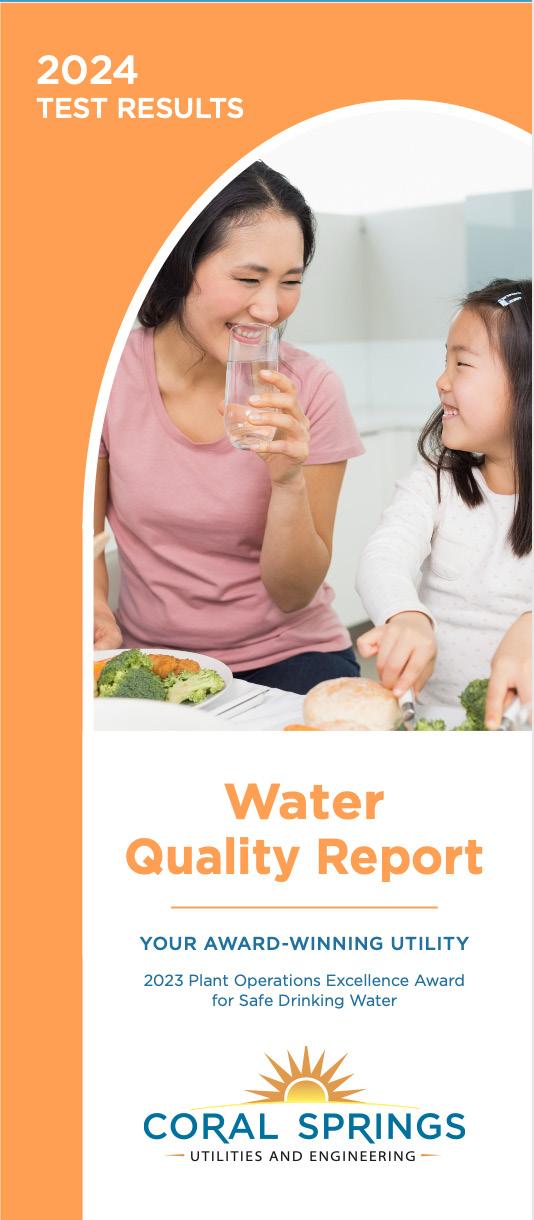
Coral Springs will continue to implement best practices to promote water conservation, promote water quality and increase current and future flood resilience and stormwater management through grey and green infrastructure. In addition to the Stormwater Master Plan, a flood vulnerability assessment is being conducted and a subsequent adaptation plan is being explored. The city partners with Broward County to promote water efficient landscaping, enforce irrigation restrictions and provide residents with rebates for eligible water efficient home upgrades. The City of Coral Springs water utility is currently designing a new water treatment plant that will ensure more sustainable and resilient water treatment in the future. Other projects underway include the continuous rehabilitation and improvements of infrastructure such as pipelines, inflow and infiltration, lift stations and pumps.

Category Summary
Access to reliable energy is critical in determining the quality of life for residents. Additionally, cities consume over two-thirds of the world’s energy and account for more than 75% of global CO2 emissions, which means they play a huge role in improving air quality and combating climate change. This category encourages cities to provide equitable access to reliable power while simultaneously reducing the adverse impacts of energy use on environment.
Credit Summary
• Power Access, Reliability and Resiliency: Required
The prerequisite on Power Access, Reliability and Resiliency addresses equitable access to a reliable power supply, along with system resiliency to withstand shocks and stresses.
° Electricity Access. All buildings within the City of Coral Springs have access to electric utility services provided by Florida Power & Light (FPL).
° Reliability Performance Measuring. FPL continuously monitors reliability performance of electric distribution. This is captured by reports that measure service interruption such as SAIDI (System Average Interruption Duration Index) and SAIFI (System Average Interruption Duration Frequency Index).
° Power Surety and Resilience. The city maintains detailed information about critical loads and essential services that require backup power in the case of widespread power outages or disasters. The city’s Fleet Division oversees
the operation and maintenance of all stationary and portable generators that provide backup power. Standard Operating Procedures include weekly exercising of the generators, monthly inspections and scheduled preventative maintenance. Certified, licensed vendors handle inspections, reporting, maintenance and testing of above and underground storage tanks as required.
• Energy and Greenhouse Gas Emissions Performance: 14/14
° Coral Springs tracks greenhouse gas (GHG) emissions to understand emissions contributions by activity. The GHG inventory advances the city’s commitment to the Race to Zero goals and informs strategies to mitigate climate change. Emissions are calculated through the ICLEI ClearPath tool every five years. Based on the permanent and working population, an average of 4.81 tons of CO2 equivalent were emitted per person, per year in 2019, which results in the highest score for GHG performance.
• Energy Efficiency: 3/4
° Street Lighting and Public Area Lighting. The city’s street lighting infrastructure consists of (1) city-owned and maintained lighting which includes LED and high-pressure sodium fixtures and (2) FPL-owned streetlights which include LED fixtures. At least 70% of street and public lighting in the city meet a minimum luminous efficacy of 100 lumens per watt.
° Energy Efficiency Programs and Policies. Coral Springs promotes energy efficiency and resource conservation programs and policies in multiple ways. Staff participate in training and education related to energy and building code regulations and best practices and stay informed on local to federal policies, programs and grant funding opportunities. To assist with financing, Property Assessed Clean Energy (PACE) bonds for energy efficiency home retrofits and upgrades are available to Coral Springs residents via Broward County. The city also provides grants to aid low-income and moderateincome, owner-occupied households with energy efficient home repairs and weatherization including appliances, windows, doors and insulation. The city partners with external organizations to promote resources and provide education. In addition to city managed or promoted material, FPL offers both residents and businesses free online energy management and monitoring tools, savings programs, resources and in-person energy audits for businesses. All resources are shared on the Office of Sustainability webpage.
• Net-Zero Carbon and Climate Action: 2/4
° Climate Action Plan. Coral Springs Sustainability Action Plan includes goals and objectives to measure and reduce greenhouse gas emissions and enhance heat and flood resilience through climate mitigation and adaption measures. Since 2022, the city has pledged to join the United Nations’ Race to Zero campaign, joined the Southeast Florida Climate Compact and pledged support for the Regional Climate Action Plan 3.0. The city uses the ICLEI ClearPath tool as the monitoring, evaluation and reporting framework for greenhouse gas emissions and reduction.
• Grid Harmonization: 2/2
° Load Management. FPL offers Timeof-Use (TOU) pricing for its residential and business customers. Customers can enroll in the TOU program at no cost and can save money on their bills by shifting electric use away from “on-peak” times during the day when electricity is in high demand and pay a lower rate for electric use during “offpeak” times.
° Net Metering and Interconnection Policy. Net metering allows FPL customers who connect approved renewable generation systems to the electric grid to buy and sell electricity to FPL. Eligible energy sources include solar energy, wind energy, biomass, hydroelectric power, ocean energy, hydrogen, waste heat and geothermal energy.
Coral Springs remains committed to reducing energy and fuel consumption, maintaining and improving energy efficient infrastructure and buildings that enhance health and safety, tracking and reducing greenhouse gas emissions and promoting residential programs and awareness. As part of the city’s budgeting process, all city initiatives are reviewed for financial, operational and environmental sustainability – such as cost-effective energy efficiency for equipment purchases. The city will continue to encourage energy efficient design for new construction and redevelopment. The city will also continue to explore opportunities for renewable energy and energy efficient programs, policies and funding.
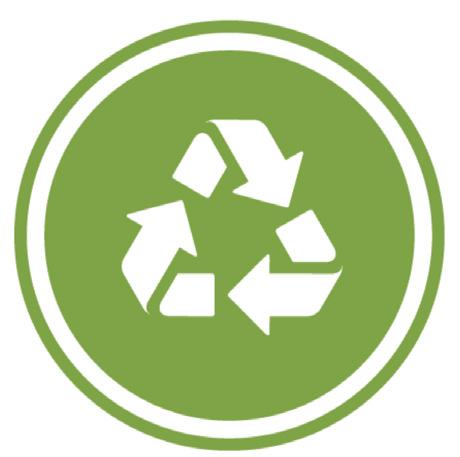
Category Summary
Cities are large material consumers and producers of solid waste. In South Florida, specifically, there are urgent concerns regarding excessive waste generation, population growth, low diversion and recycling rates, landfill capacity, lack of space to construct new facilities and environmental and public health concerns. This credit category encourages cities to sustainably manage solid waste, reduce resource consumption and support a circular economy by extending product and material lifecycles through recycling and reuse.
Credit Summary
• Solid Waste Management: Required
° Solid Waste Management Services. All sectors in the City of Coral Springs can receive waste management services.
As of October 1, 2024, Coastal Waste & Recycling is responsible for the collection of solid waste, recyclables, yard waste and bulk trash for most sectors in the City of Coral Springs. Recoverable materials are “open market” in commercial facilities.
° Solid Waste Management Plans, Ordinances and Policies. Coral Springs has multiple strategies, processes and policies in place to manage solid waste:
» The Coral Springs Code of Ordinances, Chapter 8, addresses Garbage Collection and Recycling Services.
» As of 2024, waste hauling and collection of municipal solid waste and recyclable materials is provided primarily by Coastal Waste and
Recycling via an exclusive franchise agreement between the company and Coral Springs.
» As of 2012, waste processing and disposal is managed by Broward County via an interlocal agreement between the county and participating communities, including Coral Springs.
» Waste is sorted into multiple collection categories including single-stream recycling, household hazardous waste, food scraps and construction debris.
» In 2024, Coral Springs signed the interlocal agreement for the development of the Solid Waste Authority (SWA) of Broward County. The SWA will be responsible for implementing a comprehensive, sustainability-focused materials management plan for the region.
• Waste Performance: 1/4
° Municipal solid waste generation and diversion–or recycling–data was collected across multiple sectors (residential, commercial and industrial) for the calendar year 2022. According to the unique LEED for Cities calculation, in 2022, about 112,290 U.S. tons of waste were generated in Coral Springs and about 1,678 pounds of waste were generated per person. About 24.78% of the material was diverted from incineration and landfills, excluding waste-to-energy (incineration) as a waste diversion method. The Florida Department of Environmental Protection reports annual diversion rates by county and calculation methods may differ from LEED requirements.

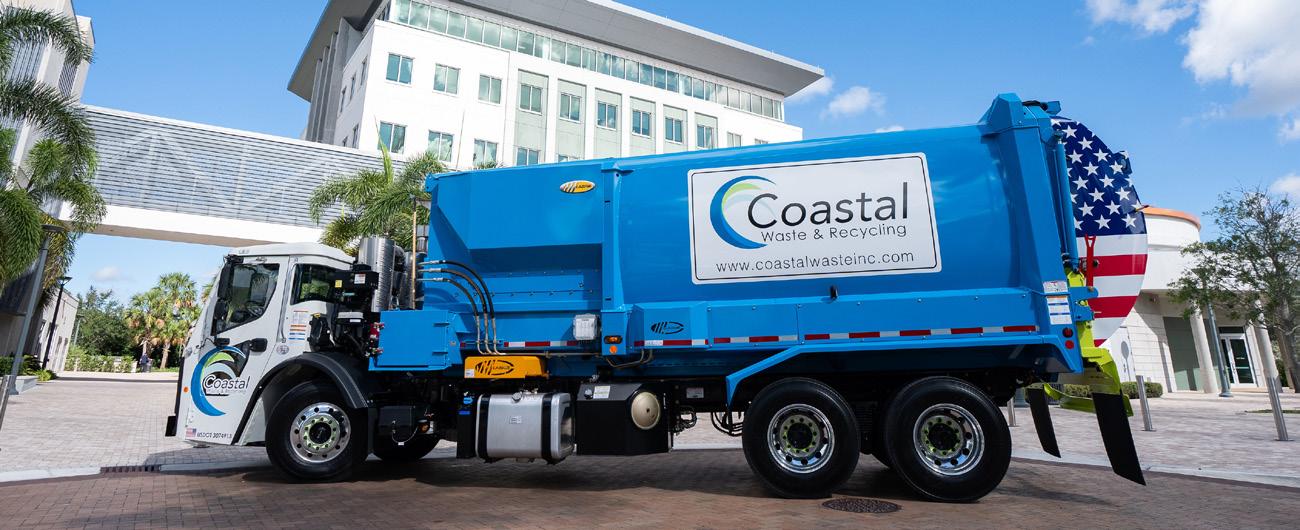
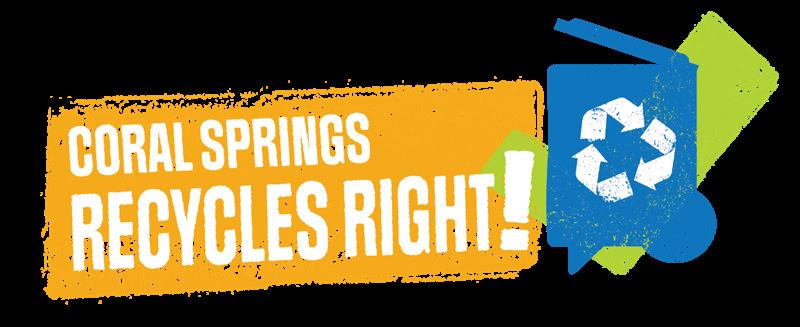
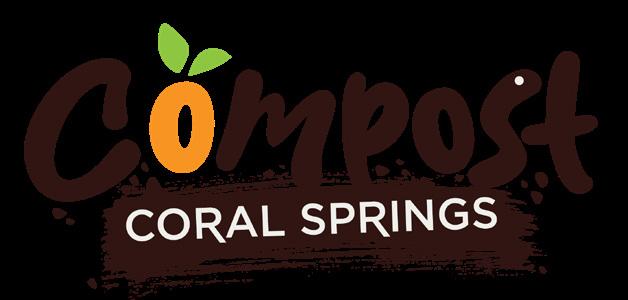
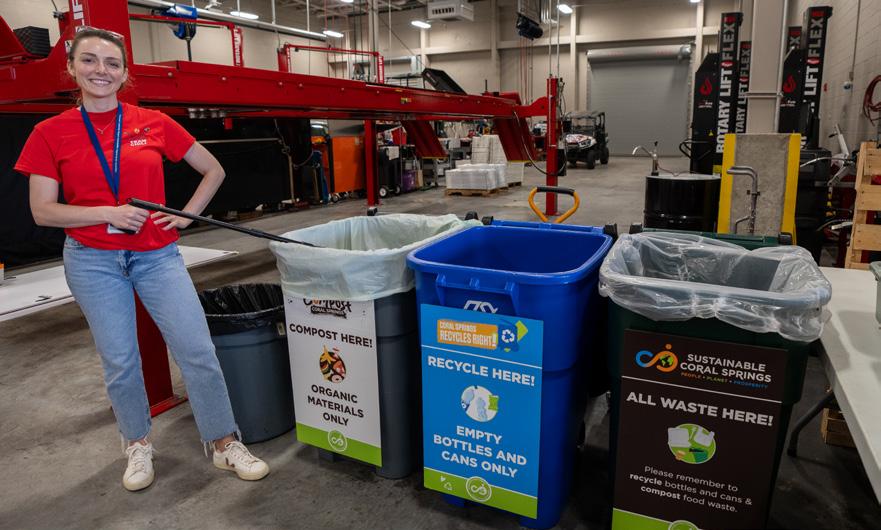
• Special Waste Streams Management: Not Attempted
° This credit was not attempted due to specific reporting requirements that were unavailable to Coral Springs from third party service providers. It is important to note, however, that in addition to residential recycling services, the City of Coral Springs diverts multiple special waste streams from landfills and incinerators. These services include household hazardous waste collection events that include electronics recycling and food waste drop-off services for composting. Construction and demolition materials and metals collected by approved vendors are sorted and recycled.
The City of Coral Springs will continue to explore opportunities that support a circular economy, material conservation and financially and environmentally responsible purchasing. The city strives to provide exceptional solid waste hauling, disposal and recycling services and to provide information and education through multiple communication channels. Coral Springs is an active member of the Solid Waste Authority of Broward County. The Authority serves to create and manage the Regional Solid Waste and Recycling Master Plan, which provides recommendations to reduce, reuse, recycle and dispose of waste generated across Broward County using an environmentally sustainable, transparent, innovative and economically efficient approach.

Category Summary
Quality of life and a higher living standard for residents is key to success and livability in a city. Quality of life encompasses multiple factors that impact individuals’ perceptions of their position and satisfaction in life such as physical health, mental state, safety, inclusion, relationships, personal beliefs and the surrounding environment and social services. This category addresses how Coral Springs equitably addresses the needs of all people.
Credit Summary
• Demographic & Social Equity Assessment : Required
° History of Housing and Neighborhood Development. The City of Coral Springs is 24 square miles in area. The city maintains a detailed account of the history of housing and neighborhood development. Coral Springs was a master-planned community since inception in 1963. It is now considered “built out” with planning focused on redevelopment and meeting the needs of the population through the city’s strategic goals. In 2023, the median sales price for a single-family home was approximately $660,000 and a 2-bedroom rental unit was approximately $2,756.
° Distribution of Social Infrastructure, Assets and Services. Coral Springs maintains 49 of the 51 parks in the city, operates multiple community centers and offers extensive and inclusive programming. The Coral SpringsParkland Fire Department serves both

Coral Springs and the City of Parkland and operates the Coral Springs Regional Institute of Public Safety—an accredited institution responsible for educating and training future firefighters, EMTs and paramedics. The Coral Springs Police Department includes approximately 230 officers and 100 civilian members, who serve to ensure Coral Springs is one of the safest communities in America. Both the Fire and Police Departments offer extensive programs and services aimed to enhance public safety and health such as active shooter and workplace security program, drug take-backs, women’s self-defense, CPR courses, drowning prevention and more . Other essential social infrastructure and services within Coral Springs that are not operated by the city include a county library, a fullservice care hospital, a multitude of medical offices and urgent care centers and approximately 17 large grocery stores, among others. There are 26 public schools and charter schools in the city, not including additional private schools and learning centers. The city is recognized as a Baldridge Community of Excellence and has created a detailed list of community offerings that enhance quality of life.
• Quality of Life Performance: 4/6
° Coral Springs received a performance score of 79/100 points based on data in Table 1.
Table 1. 2022 ACS 5-Year Estimates: Demographics and Quality of Life
*Note: Coral Springs is rated among the safest cities in America according to MoneyGeek.
• Social Services & Infrastructure: 1/3
° Community Needs Assessment. As part of its annual strategic planning process, Coral Springs conducts an annual Resident Survey and a Business Survey. Approximately every 10 years the city conducts an additional community-wide survey intended for respondents to voice wants and needs from the city for the upcoming decade. During 2023, this survey, “Vision 2035: Impressions of the Future,” was conducted and advertised extensively at all city events, meetings, through all media and through all possible partnerships. Survey results are available on the city’s Vision 2035 website. Community needs and requests are put into action through annual budget, strategic plan and business plan.
°
Equitable Access to Social Infrastructure. The city did not receive points for this item, however, there is equitable access to social infrastructure. The map below shows the distribution of police stations, fire stations, hospitals and schools. The yellow areas are lowto middle-income zones within the city according to the U.S. Department of Housing and Urban Development.

° Community Cohesion. The city did not receive points for this item, however, according to the Coral Springs Community Survey in 2024:
» 65% of residents responded positively and 23% neutral about “Acceptance of residents of all backgrounds.”
» 51% responded positively and 26% neutral about “Effectiveness of city communications with the public.”
» 44% responded positively and 32% neutral about “Sense of community among residents.”
» 43% of residents responded positively and 28% neutral about “Ability of residents to give input to the Coral Springs government.”
» When asked the opened-ended question, “What is your favorite thing about living in Coral Springs?”, 30% of responses were categorized as “Neighborhood Relations,” 38% of responses were categorized as “Local Attractions,” and 32% of responses were categorized as “Urban Development.”
According to the 2024 Business Survey results:
» Businesses reported between 51% and 80% satisfaction across nine distinct city services.
» 87% of responding businesses were satisfied with the overall City of Coral Springs customer service.
° Public Engagement. Coral Springs did not receive points for this item. However, the city ensures that public engagement is frequent and accessible to all residents. In 2024, the City of Coral Springs had thirty-one (31) citizen advisory boards, committees and groups that supported the city’s strategic goals. These groups empower residents, business owners and key stakeholders within the city to provide feedback on current programs and services and contribute to important planning. In 2024, the city did not collect racial and ethnic information from advisory boards, however, approximately half of participants are female and approximately half are male.
The city’s Communications and Marketing Department ensures ease
of access to information and twoway communication through multiple platforms. These Include social media, an ADA-compliant website and printed material. Staff regularly collaborate with trusted online news and social media accounts to generate interest in city programs and services through innovative video and photography. Translation features are included on the city’s website and closed captioning is available for CityTV and video channels. Print services, including a 20-page magazine, are sent directly to 47,000 addresses to guarantee complete coverage for all homes and registered business owners. Elected officials have their own social media accounts, which are all archived and promote interactivity with constituents in compliance with the Florida Sunshine Law.
• Economic Growth & Opportunity: 1/3
° Equitable Employment. The unemployment rate in Coral Springs in 2022 was 6.2%. When unemployment data was disaggregated by gender and race, the rates did not deviate by more than five percentage points, demonstrating equitable employment rates. However, this was not true for median income by gender or race. It was also not true for post-secondary educational attainment disaggregated by race. Post-secondary educational attainment by gender was equitable.
• Public Health: 2/3
° Public Health Metrics. The following metrics demonstrate an improving trend in Broward County or Coral Springs between 2018 and 2022: infant mortality rate, number of low-birth-weight infants, percentage of population with tobacco use, percentage of people covered under health insurance and ratio of the population to primary care physicians.
° Policies for Better Public Health. The city has multiple policies and programs to improve public health.
» Community health improvement plan. In 2025, Coral Springs implemented the Communities of
Excellence Framework to develop an extensive strategy that aims to improve the areas of economic vitality, educational achievement, housing and health. Through this strategy, Coral Springs will enhance partnerships and programs to improve and measure public health.
» Provision of medical and/or mental health services for broader community. Coral Springs offers numerous medical and mental health services for the broader community. These include the free annual Senior Health Fair ; mental wellness resources and the Behavioral Health Access Program ; and public health and safety programs provided by the Coral Springs Fire Department . The city collaborates with the University of Miami Syvester Comprehensive Cancer Center to coordinate “Game Changer” community vehicle visits to provide cancer screenings and health information to underserved communities . Additionally, the city has adopted 100% smoke-free policies for public spaces such as city buildings, parks and schools.
• Educational Opportunity & Attainment: 1/1
° Assistance and Support Programs.
Coral Springs prioritizes safe and highperforming education and schools. To support this, Coral Springs offers internships and vocational training for students and youth including summer internships for high school to graduatelevel students, career development for youth seeking careers in paramedic and emergency management fields and internship opportunities to provide work experience and training for youth with disabilities, among others. The city offers subsidized SAT preparation courses for high school students. Various afterschool and summer camp programs include arts, music, environmentalism and sports. Beginning in 2024, city employees partnered with local schools to improve performance ratings by volunteering time in the classroom.
• Civil and Human Rights: 1/1
° Civil and human rights are fundamental processes in Coral Springs. The city is deeply committed to fostering a community that is welcoming and inclusive. Policies include the Equal Employment Opportunity policy and Anti-Harassment and Non-Discrimination policy, among others. To ensure voting rights and electoral engagement, the city collaborates with the Broward County Supervisor of Elections to provide assistance, education programs and referrals to County election resources. The Human Resources department is responsible for employee safety, health and wellness and ADA compliance. Additionally, the city provides resources and programming to support community members with special needs.
Coral Springs strives to improve the quality of life for its diverse community of residents, businesses and visitors. The city collects considerable data that informs programs and policies to improve health, safety, inclusion and representation, economic growth and more. Examples of programs that are not included in the LEED Certification include a dedicated Economic Development Office that offers programs and resources to help the local business community thrive and a housing team that offers assistance to eligible families with home upgrades and down payments, among others. Coral Springs is applying the Communities of Excellence framework, recognized by the Malcolm Baldrige National Quality Award, to document and enhance community offerings that improve quality of life. Looking ahead, the Coral Springs Communities of Excellence framework will guide comprehensive programming and data collection for quality of life within the city.

Category Summary
This credit category encourages cities to achieve exceptional or innovative performance using a strategy not addressed in the LEED for Cities rating system.
Credit Summary
• Single-Use Plastics Reduction Policy
° In October 2023, the City of Coral Springs implemented the internal SingleUse Plastics Reduction Policy. The Policy eliminates or reduces the purchase and use of polystyrene foam and other single-use plastics, encourages the use of sustainable alternatives, replaces plastic water bottles in city vending machines and precedes an event policy. The intent of the policy is to reduce a major environmental and public health contaminant and to advance the city’s commitment to the implementation of sustainable practices within government operations.
• Public Art Program
° The Public Art Fund in the City of Coral Springs is a special revenue fund where public art fees are collected during the permitting process for new construction and renovations of existing structures. The General Fund does not finance this program – it is entirely self-funded through fees from new development and redevelopment. As stated in the Public Art Ordinance Section 606, all development, redevelopment, remodeling or converting greater than 12,500 square feet in gross floor area
which are in non-residential districts, or in mixed use or multi-family districts on plots greater than one (1) acre as of the effective date of this section, shall participate in the public art program. More information regarding the public art collection, Public Art Master Plan and virtual tour is located on the city’s website.
• Tree Trust Fund
° The Coral Springs Tree Trust Fund is a special revenue fund that enhances tree protection and conservation via a depository for tree removal fees and penalty monies. The fund is used solely for the preservation, maintenance, relocation and restoration of tree ecosystems on any public land in the city. Tree trust dollars are obtained from tree mitigation from new and revitalized construction projects where trees are unable to be preserved or relocated on the site. Funds are also obtained from fines for tree abuse or removing a tree without a permit. The tree trust funds have been used to enhance tree canopy along roadways, medians, parks and public buildings. In Fiscal Year 2026, the Tree Trust Fund will support a Street Tree Pilot Program to assist residents with installing tree.
• Employee Wellness Program
° Coral Springs’ cross-departmental Safety, Health and Wellness team manages a comprehensive Employee Wellness Program. The program aims to help city employees thrive by integrating mental,

physical and financial wellness into the city’s organizational infrastructure. The program and goals are part of the city’s workforce culture, which emphasizes healthy work life balance, professional development and supportive resources to enhance employee productivity, satisfaction and overall quality of life. The program fosters a positive workplace environment, reduces stress and encourages a culture of care and engagement among employees. Programs and policies that have been implemented by the Safety, Health and Wellness team include: a wellness program, employee assistance program, behavioral health access program, employee health and wellness center, wellness platforms, holiday wellbeing hours, free health coaching and dietician services, clinician services, financial wellness seminars and coaching and assistance to employees to access high quality care.
• LEED Accredited Professional
° Several employees across multiple city departments are trained in sustainable development and professionally certified through diverse institutions.
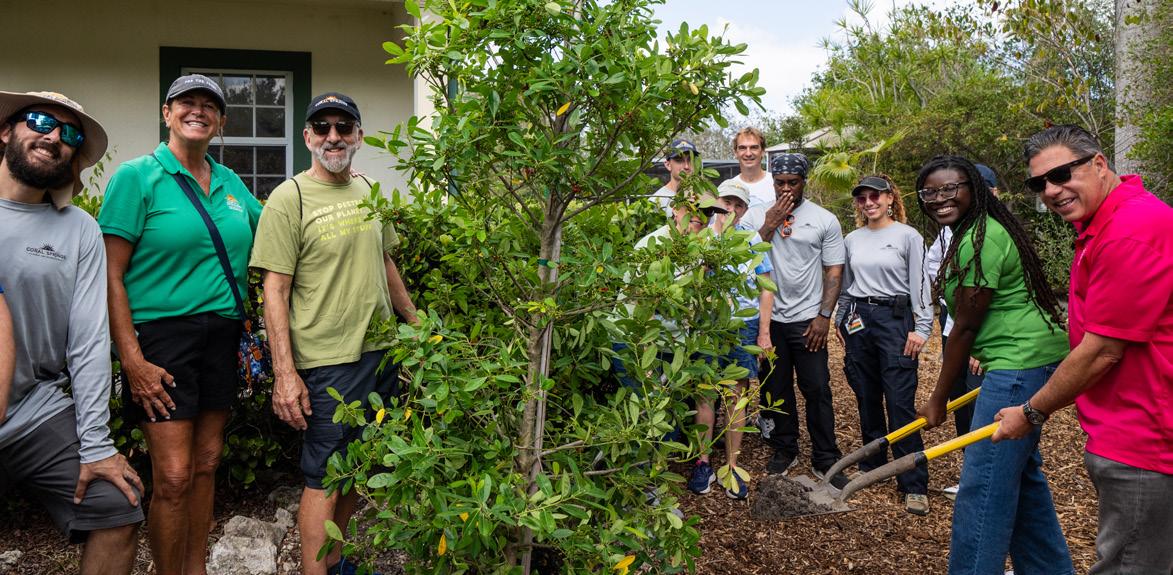

The team lead for the LEED for Cities certification process and Zoning Manager, Elizabeth Chang, is both LEED Accredited Professional (LEED AP) certified and has completed the LEED for Cities and Communities training program.
Coral Springs strives to achieve premier levels of performance through an innovative and healthy workforce, implementation of best practices and consistent community engagement. One of Coral Springs’ strategic goals is to be an innovative, high-performing and sustainable organization. Through this goal, the city remains committed to ethical governance, adherence to our core values, transparency, innovation, collaboration and exceeding customer expectations by delivering high-quality programs and services that meet the needs of an increasingly diverse community.

Category Summary
Socio-economic and environmental priorities and challenges vary based on context and geography specific to each city and community. This category demonstrates collaborative work on issues of regional importance such as biodiversity, watershed conservation, climate protection, air and water quality, affordable housing, economic development and wildfire management.
Credit Summary
• Office of Sustainability and Sustainability Action Plan
° In 2021, the Coral Springs Commission created an Office of Sustainability in alignment with the city’s vision, mission and strategic goals. In 2022, the Commission adopted the first Sustainability Action Plan (SAP). The SAP is a city-wide strategy to be managed by the Office of Sustainability and implemented collaboratively by all city departments and by community partners and residents. The overarching goals of the SAP are to (1) ensure financial, environmental and operational sustainability of all programs, projects and policies and (2) track and reduce greenhouse gas emissions. The plan contains the four focus areas of Energy and Innovation, Greening the Built Environment, Resource Management and Conservation and Economic and Community Vitality.
• Southeast Florida Regional Climate Change Compact
° The Southeast Florida Regional Climate Change Compact is a partnership between Broward, Miami-Dade, Monroe and Palm Beach Counties, to work collaboratively to build climate resilience and implement adaptation strategies across the Southeast Florida region. Coral Springs has been an active member in the Southeast Florida Regional Climate Compact and its initiatives since 2021. In 2023, the City Commission adopted a resolution pledging to endorse the Southeast Florida Climate Compact; to agree to jointly advance strategic climate adaptation and mitigation planning, programs and policies; and to advance the implementation of the 2023 Regional Climate Action Plan.
• Stormwater Master Plan with Flood Vulnerability Assessment
° Water management is critical to the entire State of Florida. Coral Springs currently experiences the challenges of floods during heavy rain events, rising groundwater associated with sea level rise, aging infrastructure and debris, trash and other pollutants entering storm drains. The Coral Springs Stormwater Master Plan evaluates existing stormwater infrastructure and identifies potential improvements to reduce flooding, sustain infrastructure and protect property. The Vulnerability Assessment identifies critical infrastructure at risk of sea-level rise and flood projections; it contributes to statewide resilience planning and complies with the Resilient Florida statute requirements.
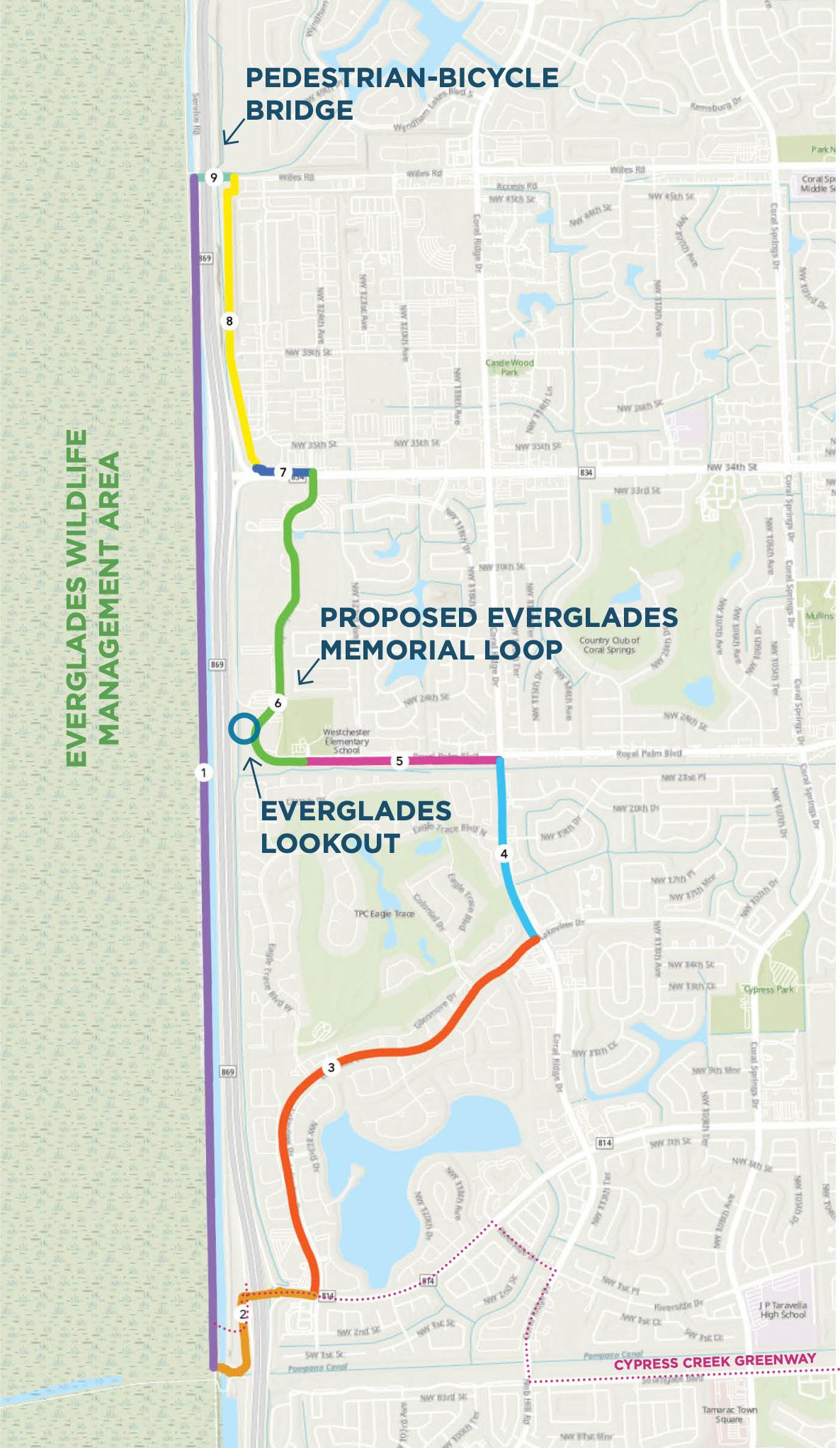
• Everglades Memorial Loop Greenway.


° Coral Springs borders the Florida Everglades - a unique mosaic of ecosystems that stretches over 200 miles of the Florida peninsula and hosts over 2,000 species of plants and animals. The Everglades National Park is a designated UNESCO World Heritage Site. Unfortunately, human disturbance led to a loss of 50% of the original Everglades, and much of what remains is impacted by challenges, leading to the need for more conservation efforts and education. The City of Coral Springs is developing the Everglades Memorial Loop, a 10-mile multimodal greenway. It will enhance pedestrian pathways in the city and connect them to the existing Everglades Conservation Levee Greenway. The Everglades Memorial Loop is intended to contribute to a healthy and active community, enhance residents’ and visitors’ access to the Everglades, and promote nature conservation through education and awareness.
Coral Springs staff will continue to implement best practices to address local and regional priorities, collaborate with multi-level stakeholders and neighboring communities and play a pivotal role in regional decision-making to best serve residents. Looking ahead, the city remains committed to actively listening to residents, to advancing strategic goals, to implementing best practices of high-performing communities and to upholding the highest professional standards. Through these efforts, Coral Springs will build upon its LEED for Cities and Communities certification, further advancing sustainability, resilience and the overall quality of life for those who live, work and raise families in our premier community.